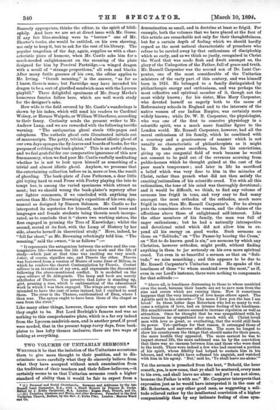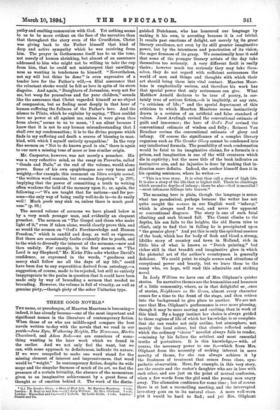TWO VOLUMES OF UNITARIAN SERMONS.* WHETHER it be that the
isolation of the Unitarians accustoms them to give more thought to their position, and to dis- criminate more carefully what they do sincerely believe from what they have accepted without much examination from the traditions of their teachers and their fellow-believers,—it certainly seems to us that Unitarian sermons reach a higher standard of ability than it would be fair to expect from a
• (1.) Personal and Social Christianity. Sermons and Addresses by the late Rumen ',ant Carpenter, BA., with a Short Memoir by Frances E. Cooke. Bdited by J. Estlin Carpenter, MA. London : Keg= Paul, Trench, and Co. —(2.) Unfailing Goodness and Mercy, and other Sermons. Preached in the first Unitarian Church, Belfast, by the Rev. J. Kirke Pike. London : Marcus Ward and Co.
denomination so small, and in doctrine at least so frigid. For example, both the volumes that we have placed at the foot of this article are remarkable not only for their thoughtfulness, but for a certain depth of feeling which we should hardly regard as the most natural characteristic of preachers who refuse to be carried away by that enthusiasm of discipleship which so early, and as we think so justly, recognised in Christ the Word that was made flesh and dwelt amongst us, the glory of the Unbegotten of the Father, full of grace and truth.
Mr. Russell Carpenter was the second son of Dr. Lant Car- penter, one of the most considerable of the Unitarian
ministers of the early part of this century, and was himself born in 1816. He belonged to a family distinguished by philanthropic energy and enthusiasm, and was perhaps the most reflective and spiritual member of it, though not the most widely known ; for his sister, Miss Mary Carpenter, who devoted herself so eagerly both to the cause of Reformatory schools in England and to the interests of the native women of our Indian Empire, was certainly more widely known ; while Dr. W. B. Carpenter, the physiologist, who was one of the first to conceive physiology in a scientific spirit, was a much more familiar figure to the London world. Mr. Russell Carpenter, however, had all the moral enthusiasm of his family, which he combined with
a courtesy and a graciousness of manner which is not usually so characteristic of philanthropists as it might be. He made great sacrifices, too, for his convictions, giving up one congenial field of work because he would not consent to be paid out of the revenues accruing from public-houses which he thought gained at the cost of the poor man's temperance ; and later in life he sacrificed a belief which was very dear to him in the miracles of Christ, rather than preach what did not then satisfy the exactinerationalism of his scientific creed. Yet with all this rationalism, the tone of his mind was thoroughly devotional; and it would be difficult, we think, to find any volume of sermons less frigid in tone, and very easy to find many amongst the most orthodox of the orthodox, much more frigid in tone, than Mr. Russell Carpenter's. For he always puts the conscience above the reason, and the claims of the affections above those of enlightened self-interest. Like the other members of his family, the man was full of eager enthusiasm; but he had a naturally introspective and devotional mind which did not allow him to ex- pend all his energy on good works. Such sermons as those on "Solitude," on "The Passer-by bearing the Cross,' on "Not to do known good is sin," are sermons by which any Christian, however orthodox, might profit, without finding anything in them to jar seriously on his own more spiritual creed. Yet even in so beautiful a sermon as that on " Soli- tude," we miss something ; and this appears to be due to Mr. Russell Carpenter's Unitarian creed. He speaks of the loneliness of those "to whom mankind owes the most," as if, even in our Lord's instance, there were nothing to compensate for that solitude :—
"Above all, is loneliness distressing to those to whom mankind owes the most, because their hearts are set to save men from the sins and errors which are ruining them. Now it sometimes happens that the very intensity of love keeps others apart. The Apostle said to his converts= The more I love you the less I am loved.' In these latter days Robertson who led so many to wel- come a religion of love, had an intense feeling of his loneliness. His sensitiveness of nature seemed to increase repulsion as well as attraction. Once he thought that he was sympathised with by none because he sympathised too much with all. Christ loved men with love so great, so everlasting, that the world still feels its power. Yet—perhaps for that reason, it estranged those of colder hearts and narrower affections. The more he longed to show his countrymen the things that should make for their peace, the more hostile they appeared. The more earnest he was to impart eternal life, the more saddened was he by the conviction that there was no oneness between him and those who were dead to the truth. There were indeed a few who had received a portion of his spirit, whose fidelity had helped to sustain him in his labours, and who might have softened his anguish, and watched with him in his agony. ' But,' said he, 'Ye shall leave me alone."
Yet the sermon is preached from the text, "Behold, the hour cometh, yea, is now come, that ye shall be scattered, every man to his own, and shall leave me alone : and yet I am not alone, because the Father is with me." Mr. Carpenter interprets that expression just as he would have interpreted it in the case of Mx. Robertson, or any other good man, as suggesting a soli- tude relieved rather by the intellectual conviction of a higher companionship than by any intimate feeling of close sym. pathy and exalting communion with God. Yet nothing seems to us to be more evident on the face of the narrative than that throughout the story even of the Crucifixion, Christ was giving back to the Father himself that kind of deep and active sympathy which be was receiving from him. The prayer in Gethsemane itself has to us the tone, not merely of human shrinking, but almost of an assurance addressed to him who might not be willing to take the cup from him, that he could not misinterpret that unwilling- ness as wanting in tenderness to himself. "Nevertheless, not my will but thine be done" is even expressive of a tender love for the Father's will,—a filial assurance that the reluctant stroke would be felt as love in spite of its stern disguise. And again," Daughters of Jerusalem, weep not for me, but weep for yourselves and for your children," sounds like the assurance that Christ regarded himself as no object of compassion, but as feeling most deeply in that hour of human suffering the fullness of the Father's love. And the silence to Pilate, which he explain e by saying, "Thou couldst have no power at all against me, unless it were given thee from above," seems to us to mean, I am silent because I know that it is not to any human misunderstanding that I shall owe my condemnation; it is to the divine purpose which finds in my suffering and death a source of blessing to man- kind, with which I myself entirely sympathise.' In the very fine sermon on "Not to do known good is sin," there is again to our ears a missing tone of more or less similar origin.
Mr. Carpenter, however, was not merely a preacher. His was a very reflective mind, as the essay on Proverbs, called "Goads and Nails," at the end of the volume, would alone prove. Some of his own apophthegms are very terse and weighty,—for example, this comment on litera scripla menet, "the written word remains, but remains forgotten" (p. 299), implying that the power of committing a truth to writing often weakens the hold of the memory upon it; or, again, the following:—" We are taught that for nations—and for per- sons—the only way of being really well-to-do is—to do really well ! Much goods may sink TIEI, unless there is much good- ness." (p. 98.)
The second volume of sermons we have placed below is by a very much younger man, and evidently an eloquent preacher. The sermon on "The Gospel and those who make light of it," even if taken alone, would clearly prove this, and so would the sermon on "God's Foreknowledge and Human Freedom," which is candid and deep, as well as vigorous. But there are occasionally faults evidently due to youth, and to the wish to diversify the interest of the sermons,—now and then unduly. For example, in the first sermon on "The Lord is my Shepherd," Mr. Kirke Pike asks whether David's confidence, as expressed in the words, "goodness and mercy shall follow me all the days of my life," could have been due to any superstition derived from astrology,—a suggestion, of course, made to be rejected, but still so entirely inappropriate to the psalm in question that it could have been made only by way of brocading a sermon that needed no brocading. However, the volume is full of vivacity, as well as genuine piety,—though piety of the sober Unitarian type.







































 Previous page
Previous page